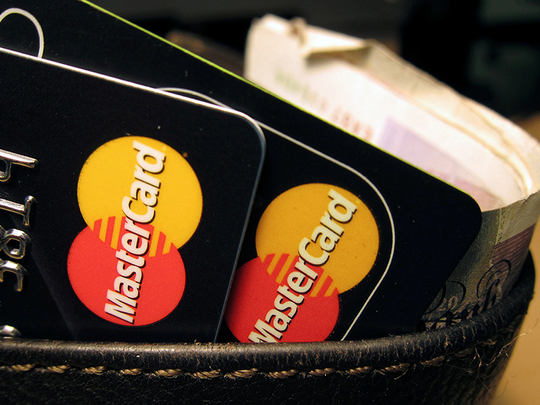
Dubai: Many still decide to confront bad credit card habits only after they are thousands of dirhams in debt. Here we discuss some lessons many regretted not learning before making mistakes that proved costly.
Although credit cards offer convenience, security, and rewards, overspending with a credit card and the interest and fees can bury you financially. So it’s important to know whether you possess such habits in the first place.
Four questions to ask yourself first
If you don’t know whether you have a bad credit card habit here are four questions to ask yourself to find out. If the answer to any of the below is yes, you are inching towards a credit card debtpile.
1. Do you pay only interest fees or minimum payments when you send in your credit card payment?
2. Have you ever paid your credit card late because you didn’t have the money for the payment?
3. Do you use your credit card when you don’t have enough cash?
4. When your issuer raises your credit limit, do you spend more because you can?
Bad credit card habits
While common mistakes include habitually paying your credit card late and taking out costly cash advances on your credit card, here are some uncommon-yet-dire mistakes that may slip under any user’s radar.
Habit #1: Missing out unauthorised or fraudulent charges
Keep in mind that one of the main benefits to reading your credit card statement is, it is one of the best ways to catch unauthorised charges and billing errors.
Don't check your credit card statement for your balance and payment information, review the entire statement to verify your account activity.
By routinely checking your online or physical statement, you can also find out well before hand if your credit limit was lowered since you last checked – as it can change because of your credit habits or your credit history.
Habit #2: Paying only the minimum can cost you dearly
It is evidently easier to make the minimum payment and this is a habit credit card companies profit from as well.
Although paying just the minimum is more convenient than to figure how much extra you can pay towards your outstanding credit card bill, keep in mind that when you’re making only the minimum payment, you’re not making much progress toward paying off your credit card bill.
Moreover, unless you have a very low balance or a zero per cent interest promotion, you’re probably paying much more in finance charges than you have to.
Habit #3: Using your credit card more than your debit card
While it’s recommended you use your credit card to amass cashback rewards or points and also pay off your credit card balance every month, you shouldn’t opt to use your credit card over your debit card, if those aren’t the reasons why you would go about using them.
Your debit card is your direct access to the funds you should use for everyday purchases, like groceries, gas, clothing, and other expenses. If you use your credit card, it should be a decision with a plan for paying off what you’re charging on the card.
Habit #4: If you are transferring balances just to avoid payments
Although promotions like balance transfers are a widely recommended strategy to pay off a high-interest rate balance on your credit card, matter experts reveal that if you’re in the habit of pursuing such promotions to avoid paying payments on your credit card, this leads to amassing long-term debts.
Financial planners reiterate that many don’t realise that balance transfers typically have fees that will increase your overall balance if you’re never making payments toward the transfer. Moreover, if you’re making purchases on the card with such a promotion, the problem gets bigger.
Expert tips to take control of these credit card habits
Lesson #1: Pay your credit card in full each month
The best way to keep your credit utilisation ratio low and avoid costly interest charges is to pay your credit card balance in full each month – which also means you also don’t incur any large due.
It’s effective to control spending by not spending more than you can comfortably pay down each month, as this helps you reduce the likelihood of developing long-running credit card debt.
If you want to take in one step further, setting a monthly spending limit that's well within your budget increases the chances that you'll actually be able to zero out your monthly balance and avoid interest charges.
Lesson #2: Keep your credit utilisation ratio low
What it means by ‘credit utilisation ratio’ is essentially the link between your credit card balances and your aggregate spending limit. For example, a Dh2,000 balance on a credit card with a Dh5,000 credit limit equates to a 40 per cent credit utilisation ratio.
As a rule of thumb, your credit utilisation ratio shouldn't exceed 40 per cent, and keep in mind that high ratios may adversely impact your credit score.
Financial advisors recommend aiming for a 30 per cent credit utilisation ratio, as that gives you some leeway to cover urgent one-off expenses, which can come unexpectedly as a result of maybe losing your job during the ongoing pandemic.
Lesson #3: Setting up customised spending alerts
If controlling your credit card spending is burdening you, it has been widely advised to set up customised spending alerts.
This will let you know when you've made an abnormally large payment or exceed a certain balance threshold and you also can pair these data alerts with security alerts to help flag any sham spending patterns.
Lesson #4: Using credit card rewards and points to your advantage
If you have a rewards credit card, you can use it to your advantage. If you have a pure cash back credit card, use any cash rewards you receive to put toward your account balance or directly deposit it into your savings account.
Alternatively, if you have a rewards points credit card, you can use your rewards to buy discounted gift cards to the stores you know, which will help save on future purchases without having to use your credit card.
If not, you could always redeem your reward points for cash redemption to put into savings or towards your account. However, ensure you know when your rewards expire to get the most out of them financially.




